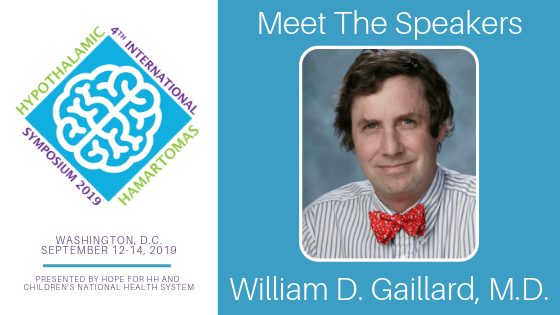
Hope for HH is co-sponsoring the 4th International Symposium on Hypothalamic Hamartomas – a professional symposium for HH investigators, clinicians and researchers – in Washington DC Sept. 12-14. The Symposium aims to identify gaps in understanding and opportunities for future HH research studies and collaborations to improve diagnosis, treatment and care of both the seizures as well as the other endocrinological and neuropsychological symptoms.
In this blog series, we will introduce you to several internationally recognized clinicians and researchers who are thought leaders both inside and outside of HH and who will serve as facilitators, presenters and discussants at the Symposium. Highlights of the Symposium will also be available to the HH patient and professional community following the meeting.
Meet Dr. William D. Gaillard
Please meet Dr. William D. Gaillard who is a Professor of Pediatrics and Neurology at the George Washington University, Professor of Neurology at Georgetown University, and Professor Adjunct of Hearing and Speech Sciences University of Maryland, College Park. He is the Chief of the Divisions of Child Neurology, Epilepsy, and Neurophysiology, as well as director of the Comprehensive Pediatric Epilepsy Program at the Children’s National Health System in Washington, D.C. Dr. Gaillard has also begun his term as President-elect of the American Epilepsy Society with 4,4400 members. He will become the President of this prestigious organization in 2020. His main research interests utilize advanced imaging to investigate the effects of epilepsy on brain structure and function during development.
Dr. Gaillard enthusiastically volunteered to Chair the 4th International Symposium on HH. He has expended an incredible amount of time building consensus around the theme, planning the agenda, identifying the most compelling speakers, and spearheading a grant application to the National Institutes of Health to help fund the Symposium. Above and beyond, Dr. Gaillard is a kind and compassionate person and clinician and we are grateful for the leadership he brings to our rare community.
What is your specialty training and background?
I am a child neurologist (so training in pediatrics and neurology) with additional training in epilepsy, clinical neurophysiology (EEG or brain squiggles), and neuroimaging.
How did you become interested in HH research and care? What are your contributions to the HH field of research and care?
My interest stems from a study at NIH of children with gelastic epilepsy, Precocious puberty and Hypothalamic Hamartoma (most children had Pallister Hall Syndrome) and was struck by the disparity of those with preserved cognition and behavior and those whose behavior deteriorated. With Dr. Oluigbo we have worked to establish and improve upon minimally invasive techniques to cure HH epilepsy.
The Symposium is important because…
The symposium is important as medical fields, especially regarding rare epilepsy, are advanced with periodic meetings where key investigators nay gather for several days to chat formally and informally over recent advances and new ideas and projects. This meeting will continue that tradition, I expect particular advances in genetics and functional imaging to be presented as well as tackling the very tricky area of behavior and cognition in HH.
Outside of work…
Its all about Dogs
Call to Action
Like to share your feedback about the Symposium, speaker or topic, please send your comments to info@hopeforhh.org.
Would you like to support the Symposium and research with a donation to Hope for HH? Click here to Donate.





